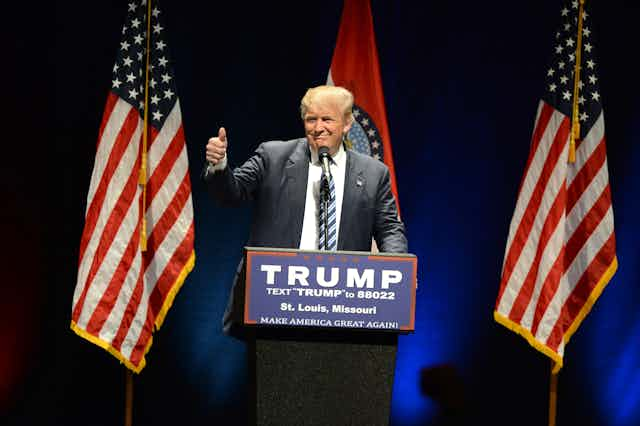From “disappointing corgis” to favourite football teams, social media users seem to “like” or follow just about anything to receive online updates on their favourite topics. You might find out your best friend is a cat person, has turned vegan or is the founding member of a running club via social media. All pretty normal, even if you don’t feel the same yourself.
But what if you found out that they had “liked” Jeremy Corbyn on Facebook, or joined a page supporting Donald Trump – what would you think then?
Our research has found that users are worried about others’ perceptions of their political views and voting choices – so much so that they are reluctant to “like” a political party on Facebook. Even if they have voted for their preferred party on many occasions, publicly “liking” it seems to be one step too far.
We surveyed more than 200 UK voters in the run up to the 2015 general election, and found that voters’ concerns about their Facebook friends’ opinions hindered their engagement with political parties on social media. This is not just a UK problem: early results from our study of around 1,000 US voters in the run up to the November 8 elections show they have similar concerns.
Social revelations
Around 60% of the UK and US populations are active Facebook users. There has been a lot of hype that social media is having a huge influence over the US electorate in particular, but the figures tell a different story. As of July 2016, 4.9m people had “liked” Hillary Clinton’s Facebook page while 9.9m had “liked” Donald Trump’s page – representing just 1.5% and 3.1% of the overall US population respectively.
In 2015, the UK Conservative Party secured 11.3m votes but had just 450,000 “likes” on Facebook. Similarly, the Labour Party secured 9.3m votes but only had 300,000 “likes”. Without going into too much detail on the parties’ social media strategies here, we found that less liberal individuals showed a greater intention to “like” the Conservatives’ Facebook page, and more liberal individuals an increased intention to “like” Labour’s Facebook page.
Evidently, regardless of any possible benefits of getting automatic updates and information from one’s preferred political parties on Facebook, people shy away from doing so for fear of what their network will think of them. But information is paramount when deciding who to vote for – and social media can play a vital part in helping voters make their decision.
Unlike in face-to-face interactions, where people have more control over who they reveal their political inclination to, on Facebook actions are largely visible to a person’s whole list of friends at once. Any social media user will tell you of a time they “unfriended” another because of their annoying, confusing or confrontational posts, whether politically motivated or not. And most users will have friends from other points of the political spectrum – so it is nearly impossible to avoid appearing negative to at least some friends when showing your political preferences.
Political anxiety
Our research also found that the more a person felt that “liking” a political party or candidate appeared negative to their Facebook friends, the greater the anxiety that was linked to this action.
The results showed that “liking” more right-wing political entities – for example the Conservative Party and Donald Trump – caused approximately 20% more anxiety than “liking” more liberal rivals such as the Labour Party or Hillary Clinton. This was so even when the participants’ own political stance was accounted for. In general, this suggests that no matter what your personal beliefs are, appearing more right-wing on Facebook is perceived as being more socially undesirable. Though certainly both Trump and the Conservatives overall garnered more likes, this could be due to other engagement work.
So what to do? Voters can’t be forced to “like” pages just so they can receive automatic information updates via their favoured candidate’s post. Neither should they go uninformed. Although people want to “like” political entities as a gateway to receive information from them, as the situation stands many will choose not to.
However, we found that if people were given the option to “like” political pages secretly then they would be more likely to do so. At present, voters can follow pages secretly via RSS feeds, but not many people are aware of this option.
Voters could also search for a page whenever they feel like it, but this limits their engagement. That is why we propose that social media designers should start thinking about an easy mechanism to quietly “like” – or follow – a page without it being publicly announced to their network. However, whether the parties, or indeed Facebook, would agree to get involved in a political matter is another matter entirely.

